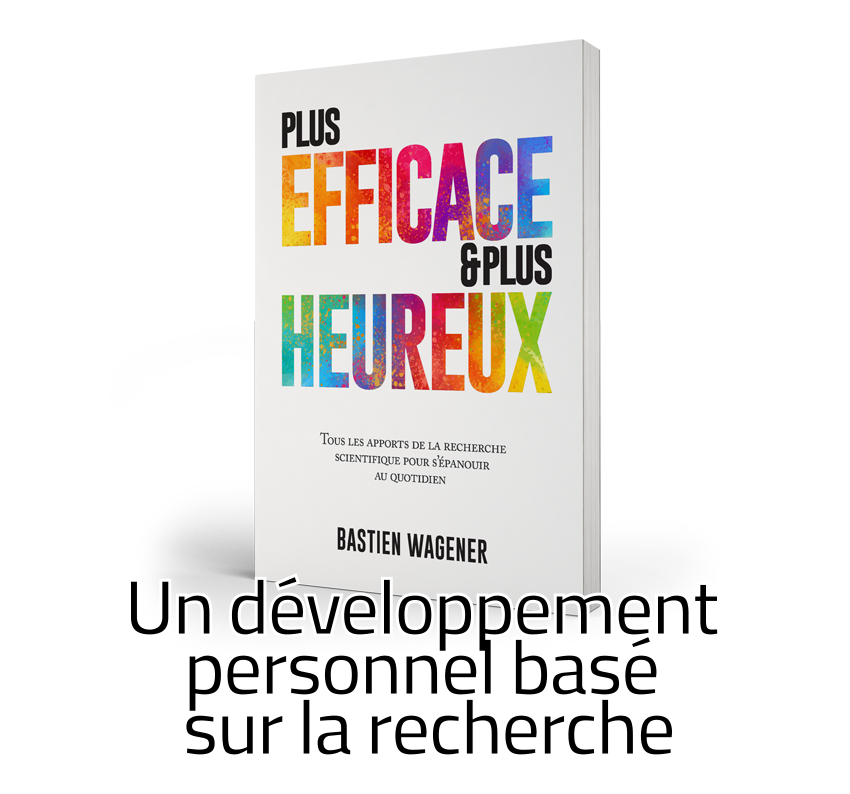Se connecter aux autres, partager leurs joies et leurs peines, se mettre à leur place, c’est indispensable au quotidien. Que l’on parle du domaine professionnel ou personnel, l’empathie est une compétence clé.
Mais cette dimension est bien plus complexe qu’on ne pourrait le croire de prime abord. Dans cet épisode du podcast, je vous propose d’explorer la notion d’empathie et d’apprendre à la développer de manière équilibrée.
Pour en savoir plus, je vous invite à écouter l’épisode.
Où écouter le podcast ?
Si vous avez aimé cet épisode et que vous voulez être notifié(e) quand le prochain sera mis en ligne, rendez vous sur Youtube, iTunes, Google Podcasts, Deezer, Spotify, TuneIn et à vous abonner.
Et enfin, si vous souhaitez soutenir ce podcast, je vous invite à l’évaluer sur iTunes, cela aide beaucoup à lui donner de la visibilité.
Mentionné dans l’émission
- Qu’est-ce que l’empathie
- L’empathie positive
- Mesurer son niveau d’empathie
- Mesurer et développer l’empathie positive, notamment via la méditation
- 8 stratégies pour développer l’empathie
Pour aller plus loin
- Mon livre : Plus efficace et plus heureux
- L’épisode du podcast sur la complexité des émotions
- Un article sur l’assertivité
- Un article sur l’intelligence émotionnelle
Qu’avez vous pensé de cet épisode ? Quelque chose à ajouter ou à partager ? Dites-le moi en commentaire !
Références
Voir les références
L’empathie
- Colman, A. M. (2015). A dictionary of psychology (Fourth edition). Oxford University Press.
- Mcdonald, N. M., & Messinger, D. S. (2011). The Development of Empathy : How, When, and Why.
- Fletcher-Watson, S., & Bird, G. (2020). Autism and empathy : What are the real links? Autism, 24(1), 3-6.
- Baron-Cohen, S., & Wheelwright, S. (2004). The empathy quotient : An investigation of adults with Asperger syndrome or high functioning autism, and normal sex differences. Journal of Autism and Developmental Disorders, 34(2), 163 175.
- Masserman, J. H., Wechkin, S., & Terris, W. (1964). « Altruistic » behavior in rhesus monkeys. American Journal of Psychiatry, 121, 584 585.
- Wellman, H. M., Cross, D., & Watson, J. (2001). Meta-Analysis of Theory-of-Mind Development : The Truth about False Belief. Child Development, 72(3), 655 684.
- Hoffman, M. L. (1993). The Contribution of Empathy to Justice and Moral Judgment. In A. I. Goldman (Éd.), Readings in Philosophy and Cognitive Science (The MIT Press, p. 647 680). The MIT Press.
- Knafo, A., Zahn-Waxler, C., Van Hulle, C., Robinson, J. L., & Rhee, S. H. (2008). The developmental origins of a disposition toward empathy : Genetic and environmental contributions. Emotion, 8(6), 737 752.
- Feldman, R. (2007). Mother-infant synchrony and the development of moral orientation in childhood and adolescence : Direct and indirect mechanisms of developmental continuity. American Journal of Orthopsychiatry, 77(4), 582 597.
- Decety, J., & Yoder, K. J. (2016). Empathy and motivation for justice : Cognitive empathy and concern, but not emotional empathy, predict sensitivity to injustice for others. Social Neuroscience, 11(1), 1 14.
- Decety, J., & Cowell, J. M. (2014). The complex relation between morality and empathy. Trends in Cognitive Sciences, 18(7), 337 339.
- Irving, P., & Dickson, D. (2004). Empathy : Towards a conceptual framework for health professionals. International Journal of Health Care Quality Assurance, 17(4), 212 220.
- Jeffrey, D. (2016). Empathy, sympathy and compassion in healthcare : Is there a problem? Is there a difference? Does it matter? Journal of the Royal Society of Medicine, 109(12), 446 452.
- Sinclair, S., Beamer, K., Hack, T. F., McClement, S., Raffin Bouchal, S., Chochinov, H. M., & Hagen, N. A. (2017). Sympathy, empathy, and compassion : A grounded theory study of palliative care patients’ understandings, experiences, and preferences. Palliative Medicine, 31(5), 437 447.
- Van Bommel, T. (2021). The power of empathy in times of crisis and beyond. Catalyst.
- Plopa, M., Kaźmierczak, M., & Karasiewicz, K. (2019). The quality of parental relationships and dispositional empathy as predictors of satisfaction during the transition to marriage. Journal of Family Studies, 25(2), 170 183.
- Geiger, J. M., Piel, M. H., Lietz, C. A., & Julien-Chinn, F. J. (2016). Empathy as an Essential Foundation to Successful Foster Parenting. Journal of Child and Family Studies, 25(12), 3771 3779.
- Stebnicki, M. A. (2000). Stress and grief reactions among rehabilitation professionals : Dealing effectively with empathy fatigue. The Journal of Rehabilitation, 66(1), 29 29.
- Stebnicki, M. A. (2007). Empathy Fatigue : Healing the Mind, Body, and Spirit of Professional Counselors. American Journal of Psychiatric Rehabilitation, 10(4), 317 338.
Empathie positive
- Morelli, S. A., Lieberman, M. D., & Zaki, J. (2015b). The Emerging Study of Positive Empathy : Positive Empathy. Social and Personality Psychology Compass, 9(2), 57 68.
- Pittinsky, T. L., & Montoya, R. M. (2016). Empathic Joy in Positive Intergroup Relations : Empathic Joy. Journal of Social Issues, 72(3), 511 523.
- Telle, N.-T., & Pfister, H.-R. (2016). Positive Empathy and Prosocial Behavior : A Neglected Link. Emotion Review, 8(2), 154 163.
- Andreychik, M. R., & Lewis, E. (2017). Will you help me to suffer less? How about to feel more joy? Positive and negative empathy are associated with different other-oriented motivations. Personality and Individual Differences, 105, 139 149.
- Taiwo, Z., Bezdek, M., Mirabito, G., & Light, S. N. (2021). Empathy for joy recruits a broader prefrontal network than empathy for sadness and is predicted by executive functioning. Neuropsychology, 35(1), 90 102.
- Morelli, S. A., Sacchet, M. D., & Zaki, J. (2015). Common and distinct neural correlates of personal and vicarious reward : A quantitative meta-analysis. NeuroImage, 112, 244 253.
- Zeng, X., Liao, R., Zhang, R., Oei, T. P. S., Yao, Z., Leung, F. Y. K., & Liu, X. (2017). Development of the Appreciative Joy Scale. Mindfulness, 8(2), 286 299.
- Andreychik, M. R. (2017). I like that you feel my pain, but I love that you feel my joy : Empathy for a partner’s negative versus positive emotions independently affect relationship quality. Journal of Social and Personal Relationships, 36(3), 834 854.
- Andreychik, M. R. (2019). Feeling your joy helps me to bear feeling your pain : Examining associations between empathy for others’ positive versus negative emotions and burnout. Personality and Individual Differences, 137, 147 156.
Test empathie
- Baron-Cohen, S., & Wheelwright, S. (2004). Baron-Cohen et Wheelwright, 2004. Journal of Autism and Developmental Disorders, 34(2), 163 175.
- Mcdonald, N. M., & Messinger, D. S. (2011). The Development of Empathy : How, When, and Why.
- Decety, J., & Cowell, J. M. (2014). The complex relation between morality and empathy. Trends in Cognitive Sciences, 18(7), 337 339.
- Jeffrey, D. (2016). Empathy, sympathy and compassion in healthcare : Is there a problem? Is there a difference? Does it matter? Journal of the Royal Society of Medicine, 109(12), 446 452.
- Decety, J., & Yoder, K. J. (2016). Empathy and motivation for justice : Cognitive empathy and concern, but not emotional empathy, predict sensitivity to injustice for others. Social Neuroscience, 11(1), 1 14.
- Spreng, R. N., McKinnon*, M. C., Mar, R. A., & Levine, B. (2009). The Toronto Empathy Questionnaire : Scale Development and Initial Validation of a Factor-Analytic Solution to Multiple Empathy Measures. Journal of Personality Assessment, 91(1), 62 71.
Développer l’empathie
- Baron-Cohen, S., & Wheelwright, S. (2004). Baron-Cohen et Wheelwright, 2004. Journal of Autism and Developmental Disorders, 34(2), 163 175.
- Mcdonald, N. M., & Messinger, D. S. (2011). The Development of Empathy : How, When, and Why.
- Decety, J., & Yoder, K. J. (2016). Empathy and motivation for justice : Cognitive empathy and concern, but not emotional empathy, predict sensitivity to injustice for others. Social Neuroscience, 11(1), 1 14.
- Decety, J., & Cowell, J. M. (2014). The complex relation between morality and empathy. Trends in Cognitive Sciences, 18(7), 337 339.
- Irving, P., & Dickson, D. (2004). Empathy : Towards a conceptual framework for health professionals. International Journal of Health Care Quality Assurance, 17(4), 212 220.
- Jeffrey, D. (2016). Empathy, sympathy and compassion in healthcare : Is there a problem? Is there a difference? Does it matter? Journal of the Royal Society of Medicine, 109(12), 446 452.
- Eyal, T., Steffel, M., & Epley, N. (2018). Research : Perspective-taking doesn’t help you understand what others want. Harvard Business Review.
- Krznaric, R. (2012). Six Habits of Highly Empathic People. Greater Good Magazine.
- Halpern, J., & Weinstein, H. M. (2004). Rehumanizing the Other : Empathy and Reconciliation. Human Rights Quarterly, 26(3), 561 583.
- Kidd, D. C., & Castano, E. (2013). Reading Literary Fiction Improves Theory of Mind. Science, 342(6156), 377 380.
Retrouvez la page consacrée au podcast ici : le podcast se réaliser
Mais aussi toutes les notes et précisions pour chaque épisode en suivant ce lien : pages des épisodes






Merci d’être passé(e) sur le site et d’avoir pris le temps de lire cet article ! J’espère que vous l’avez apprécié.
N’hésitez pas à me laisser un commentaire si vous avez des questions. Je fais de mon mieux pour lire et répondre à tous les commentaires postés sur le blog, alors ne soyez pas timide !
Si vous appréciez le contenu proposé sur se-realiser.com, vous pouvez vous inscrire à notre newsletter (formulaire d’inscription dans la colonne de droite) pour rester au courant de toutes les actualités du site (pas de spam, pas de revente d’informations, rassurez-vous !).